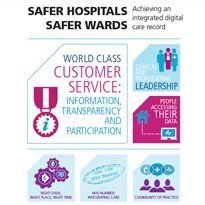The inclusion of open application programming interfaces in supplier contracts will be a pre-requisite for trusts applying to the £260m Technology Fund.
Trusts need to apply by the end of this month for part of the £260m Safer Hospitals, Safer Wards Technology Fund; and the money must be spent by March 2015.
Guidance released by NHS England, ‘Safer Hospitals Safer Wards: Achieving an integrated digital care record’, says £90m will be available in this financial year and £170m in the next. Trusts must match any funding they receive.
Beverley Bryant, NHS England’s director of strategic systems and technology and lead on the new guidance, told EHI that open APIs will be a pre-requisite for trusts looking for money.
Bryant said that NHS England cannot mandate open APIs as part of secondary care IT contracts, but is encouraging their adoption.
The guidance says APIs should be both commercially and technically open, meaning they “should be published and their usage not restricted subject to a reasonable assurance test having been satisfied."
Head of healthcare at Intellect, Jon Lindberg, said the industry trade body supports the use of open standards as far as possible.
“Open APIs is one way to achieve the joining up of disparate systems within and across care settings and allowing a vibrant market to flourish,” he said.
“However we recognise that more work needs to be done between NHS and industry in working out what this means in practice, commercially and technically.”
The guidance says the Technology Fund is aimed at trusts at the beginning of the journey towards electronic record keeping as well as advanced trusts, which may require “high-end functionality” such as e-prescribing.
Bryant said the initial application form has been kept relatively simple to encourage organisations at different stages of development to apply.
To be successful, trusts do not necessarily need a “shiny plan with all the evidence”, but to be able to show buy-in to the project at board level and clinical level.
An advisory panel made up of around 40 people, mostly from NHS England the Health and Social Care Information Centre, will work with trusts during August and September to review their applications and help translate their vision into a plan.
“We will work with them through due diligence to create a proper robust plan and they will get the money,” she explained.
Bryant and NHS England’s clinical informatics director Jonathan Kay are leading the assessment process. Successful projects will be announced this October.

